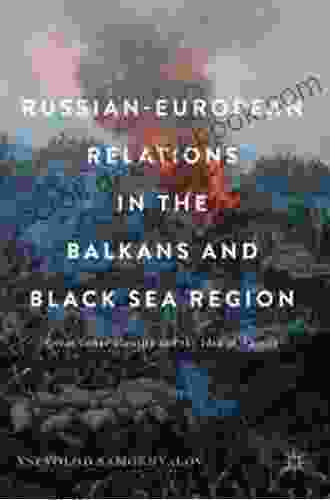Russian-European Relations in the Balkans and Black Sea Region: A Historical Perspective

4.3 out of 5
| Language | : | English |
| File size | : | 1785 KB |
| Text-to-Speech | : | Enabled |
| Enhanced typesetting | : | Enabled |
| Word Wise | : | Enabled |
| Print length | : | 345 pages |
| Screen Reader | : | Supported |
The Balkans and the Black Sea region have long been a crossroads of civilizations, a melting pot of cultures, and a battleground for empires. At the heart of this complex geopolitical landscape lies the relationship between Russia and Europe, a relationship that has been marked by both cooperation and conflict over centuries.
This article provides a comprehensive overview of Russian-European relations in the Balkans and Black Sea region, exploring their historical evolution, key events, and geopolitical implications. It analyzes the complex interplay of political, economic, and cultural factors that have shaped these relationships over centuries. The article also examines the current state of relations between Russia and European countries in the region, discussing areas of cooperation and potential challenges.
Historical Evolution
Russian interest in the Balkans and the Black Sea region dates back to the 18th century, when the Russian Empire began to expand southward in search of warm-water ports. Russia's involvement in the region increased throughout the 19th century, as it fought a series of wars against the Ottoman Empire, which controlled much of the Balkans.
After the collapse of the Ottoman Empire in 1918, Russia emerged as a major power in the Balkans, supporting communist governments in Bulgaria, Romania, and Yugoslavia. However, the Cold War divided the region, with the Balkans becoming a frontline in the ideological struggle between the Soviet Union and the West.
After the collapse of the Soviet Union in 1991, Russia's influence in the Balkans waned, but it has remained an important player in the region, particularly in Serbia and Montenegro. In recent years, Russia has also sought to increase its influence in the Black Sea region, particularly in Ukraine and Georgia.
Key Events
- 1774: Treaty of Küçük Kaynarca - Russia gains control of the Crimean Peninsula and the right to intervene in Ottoman affairs on behalf of Orthodox Christians.
- 1877-1878: Russo-Turkish War - Russia defeats the Ottoman Empire and gains control of parts of the Balkans, including Bulgaria and Romania.
- 1917: Russian Revolution - The Bolsheviks seize power in Russia and establish a communist government.
- 1945-1991: Cold War - The Balkans and the Black Sea region become a frontline in the ideological struggle between the Soviet Union and the West.
- 1991: Collapse of the Soviet Union - Russia's influence in the Balkans wanes, but it remains an important player in the region.
- 2008: Russo-Georgian War - Russia invades Georgia, further straining relations with the West.
- 2014: Russian annexation of Crimea - Russia annexes the Crimean Peninsula from Ukraine, leading to a further deterioration in relations with the West.
Geopolitical Implications
The relationship between Russia and Europe in the Balkans and Black Sea region has significant geopolitical implications. The region is a strategic crossroads, connecting Europe to Asia and the Middle East. It is also home to significant energy resources, including oil and gas.
Russia's interest in the region is driven by a number of factors, including its desire to secure access to warm-water ports, to protect its Orthodox Christian heritage, and to maintain its influence in a region that has been historically important to Russia.
Europe's interest in the region is also driven by a number of factors, including its desire to promote stability and democracy in its neighborhood, to secure access to energy resources, and to prevent Russia from dominating the region.
The complex interplay of interests between Russia and Europe in the Balkans and Black Sea region has led to a number of conflicts and tensions over the years. However, it has also led to cooperation in areas such as energy and trade.
Current Relations
The current state of relations between Russia and European countries in the Balkans and Black Sea region is complex and multifaceted. There are areas of cooperation, such as energy and trade, but there are also areas of tension, such as the ongoing conflict in Ukraine and Russia's annexation of Crimea.
Russia has been accused of using its energy resources as a political weapon, and it has been criticized for its support for authoritarian regimes in the region. However, Russia has also been a major investor in the region, and it has played a role in promoting economic development.
European countries have been divided in their response to Russia's actions in the region. Some countries, such as Poland and the Baltic states, have taken a hard line against Russia, while others, such as Germany and France, have sought to maintain a dialogue with Russia.
The future of Russian-European relations in the Balkans and Black Sea region is uncertain. However, it is clear that the region will remain a key area of geopolitical competition between Russia and Europe for years to come.
The relationship between Russia and Europe in the Balkans and Black Sea region is a complex and dynamic one. It has been shaped by a long history of cooperation and conflict, and it continues to be influenced by a number of geopolitical factors.
The current state of relations between Russia and European countries in the region is complex and multifaceted. There are areas of cooperation, such as energy and trade, but there are also areas of tension, such as the ongoing conflict in Ukraine and Russia's annexation of Crimea.
The future of Russian-European relations in the Balkans and Black Sea region is uncertain. However, it is clear that the region will remain a key area of geopolitical competition between Russia and Europe for years to come.
4.3 out of 5
| Language | : | English |
| File size | : | 1785 KB |
| Text-to-Speech | : | Enabled |
| Enhanced typesetting | : | Enabled |
| Word Wise | : | Enabled |
| Print length | : | 345 pages |
| Screen Reader | : | Supported |
Do you want to contribute by writing guest posts on this blog?
Please contact us and send us a resume of previous articles that you have written.
 Book
Book Chapter
Chapter Text
Text Story
Story Reader
Reader Library
Library Paperback
Paperback E-book
E-book Magazine
Magazine Paragraph
Paragraph Sentence
Sentence Bookmark
Bookmark Shelf
Shelf Glossary
Glossary Foreword
Foreword Annotation
Annotation Footnote
Footnote Scroll
Scroll Codex
Codex Library card
Library card Autobiography
Autobiography Dictionary
Dictionary Thesaurus
Thesaurus Narrator
Narrator Character
Character Resolution
Resolution Librarian
Librarian Catalog
Catalog Card Catalog
Card Catalog Stacks
Stacks Periodicals
Periodicals Study
Study Research
Research Lending
Lending Rare Books
Rare Books Special Collections
Special Collections Study Group
Study Group Awards
Awards Reading List
Reading List Textbooks
Textbooks Dalton Mullins
Dalton Mullins Dylan Cruise
Dylan Cruise Ame Ai
Ame Ai Cynthia Augustin
Cynthia Augustin Chris Oler
Chris Oler Bridget E Baker
Bridget E Baker Kelvin Dorsey
Kelvin Dorsey Janka Neumann
Janka Neumann Travis Mays
Travis Mays Will Toor
Will Toor Sean Murphy
Sean Murphy Anne O Brien Carelli
Anne O Brien Carelli Barbara A Somervill
Barbara A Somervill Giovanni Soriano
Giovanni Soriano Liz Cassidy
Liz Cassidy Mary Beth Brace
Mary Beth Brace Tom Jokinen
Tom Jokinen Rick Adams
Rick Adams Katie Hornor
Katie Hornor Robyn Thorn
Robyn Thorn
Light bulbAdvertise smarter! Our strategic ad space ensures maximum exposure. Reserve your spot today!

 Ryūnosuke AkutagawaThe Enchanting Fusion of Flute and Guitar in the Music of Johannes Brahms
Ryūnosuke AkutagawaThe Enchanting Fusion of Flute and Guitar in the Music of Johannes Brahms Edwin BlairFollow ·9k
Edwin BlairFollow ·9k Bob CooperFollow ·19.2k
Bob CooperFollow ·19.2k Aubrey BlairFollow ·15k
Aubrey BlairFollow ·15k Tom HayesFollow ·14.9k
Tom HayesFollow ·14.9k John UpdikeFollow ·2.6k
John UpdikeFollow ·2.6k Jake CarterFollow ·14.6k
Jake CarterFollow ·14.6k Marvin HayesFollow ·12.6k
Marvin HayesFollow ·12.6k Rubén DaríoFollow ·8k
Rubén DaríoFollow ·8k

 Howard Powell
Howard PowellDk Workbooks Science Third Grade: An In-Depth Exploration...
Science education plays a...

 Everett Bell
Everett BellLearn to Play Bluegrass Dobro Guitar: A Comprehensive...
: Bluegrass Dobro, A Story of...

 Jeffrey Cox
Jeffrey CoxHow the Raccoon Got His Mask
The raccoon, with its...

 George Bell
George BellHannah Meets Ruby Hannah Out West: An Adventure-Filled...
Hannah Meets...
4.3 out of 5
| Language | : | English |
| File size | : | 1785 KB |
| Text-to-Speech | : | Enabled |
| Enhanced typesetting | : | Enabled |
| Word Wise | : | Enabled |
| Print length | : | 345 pages |
| Screen Reader | : | Supported |














